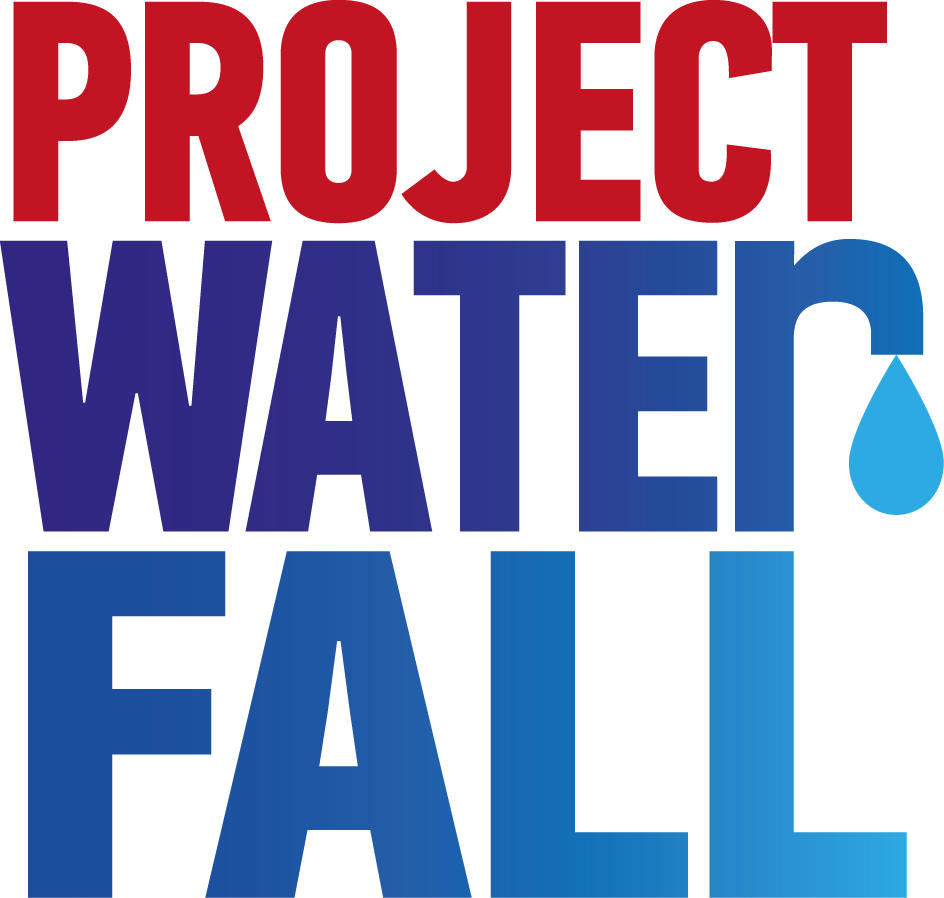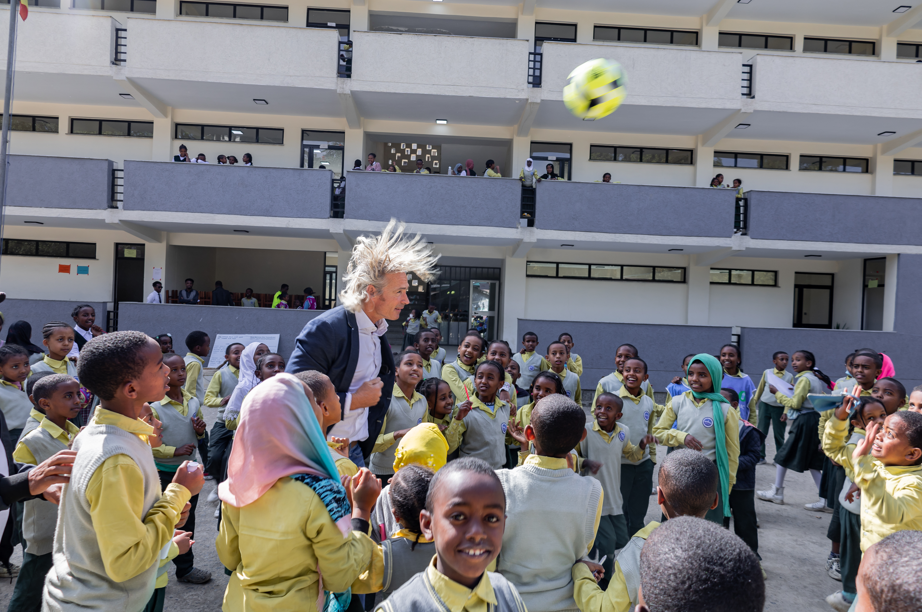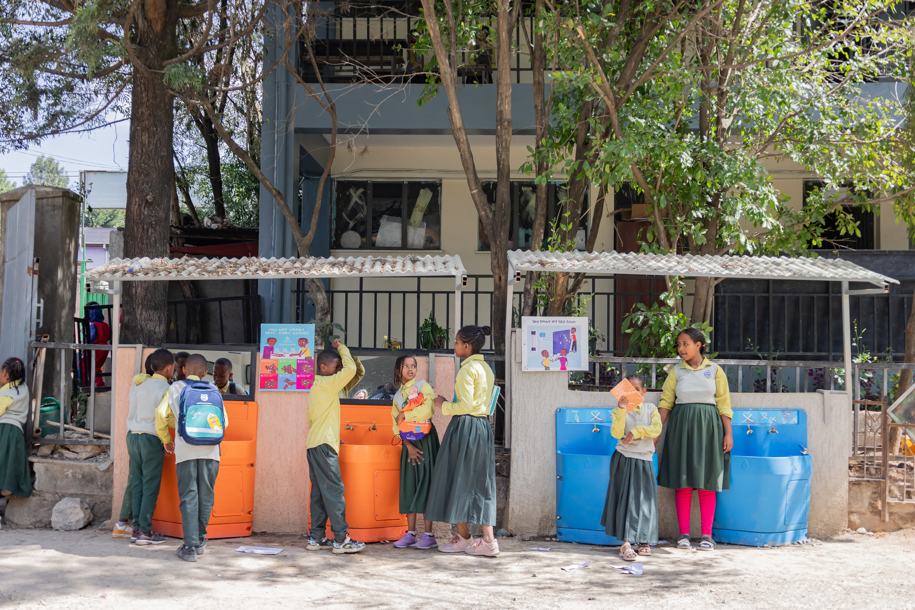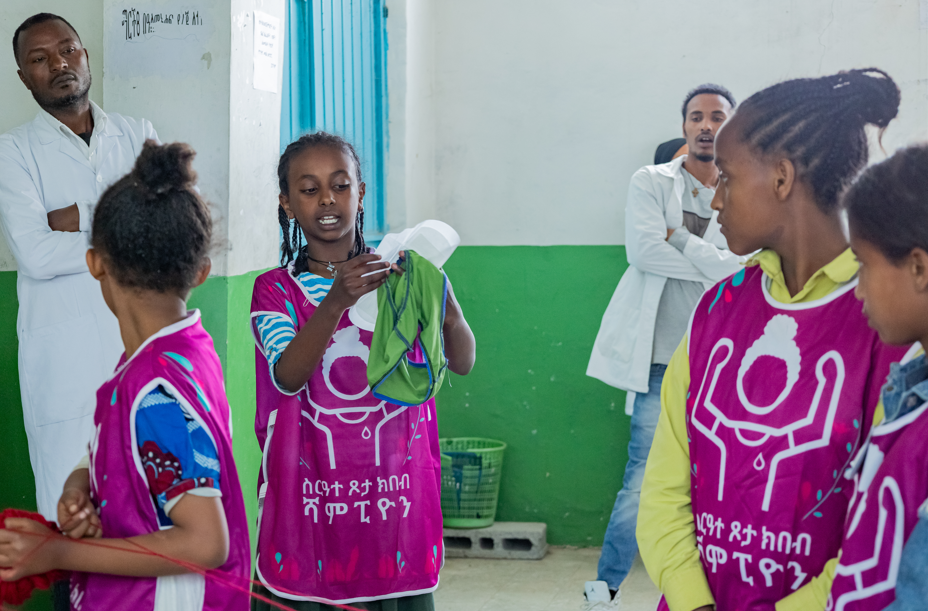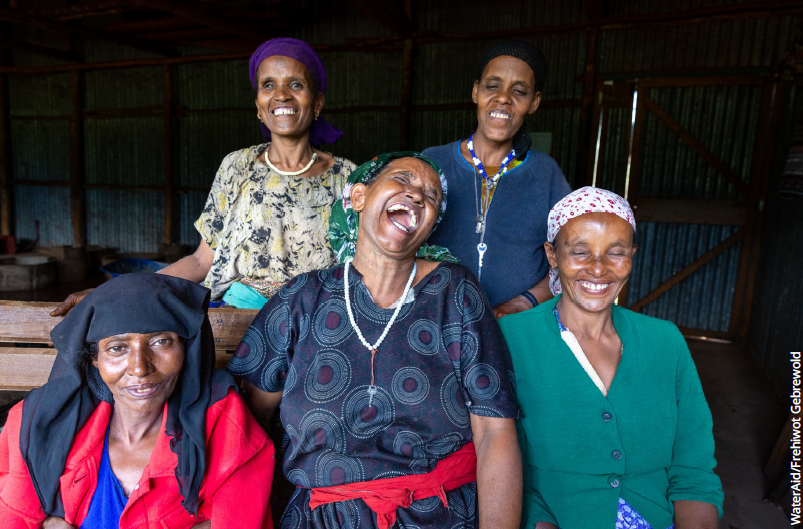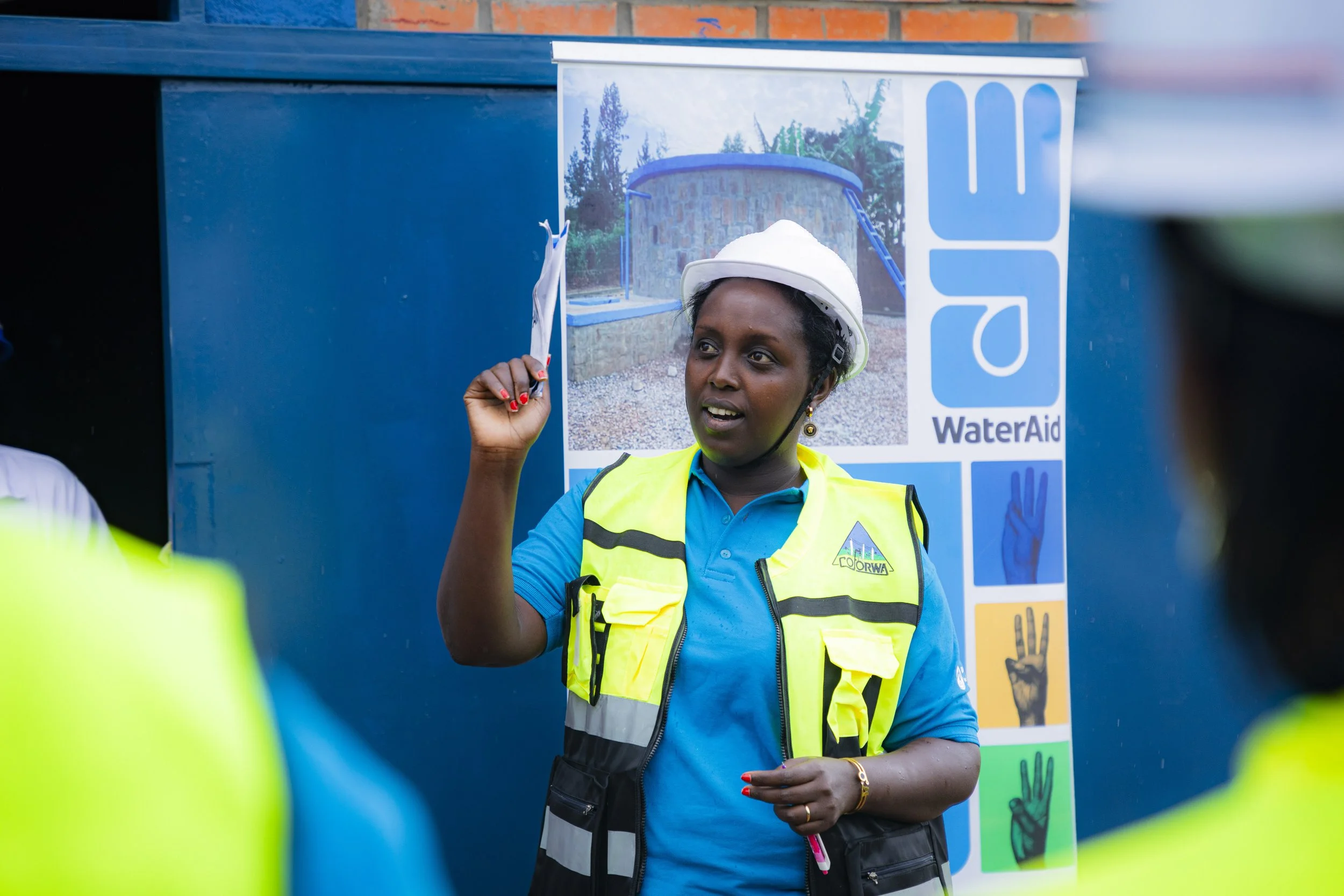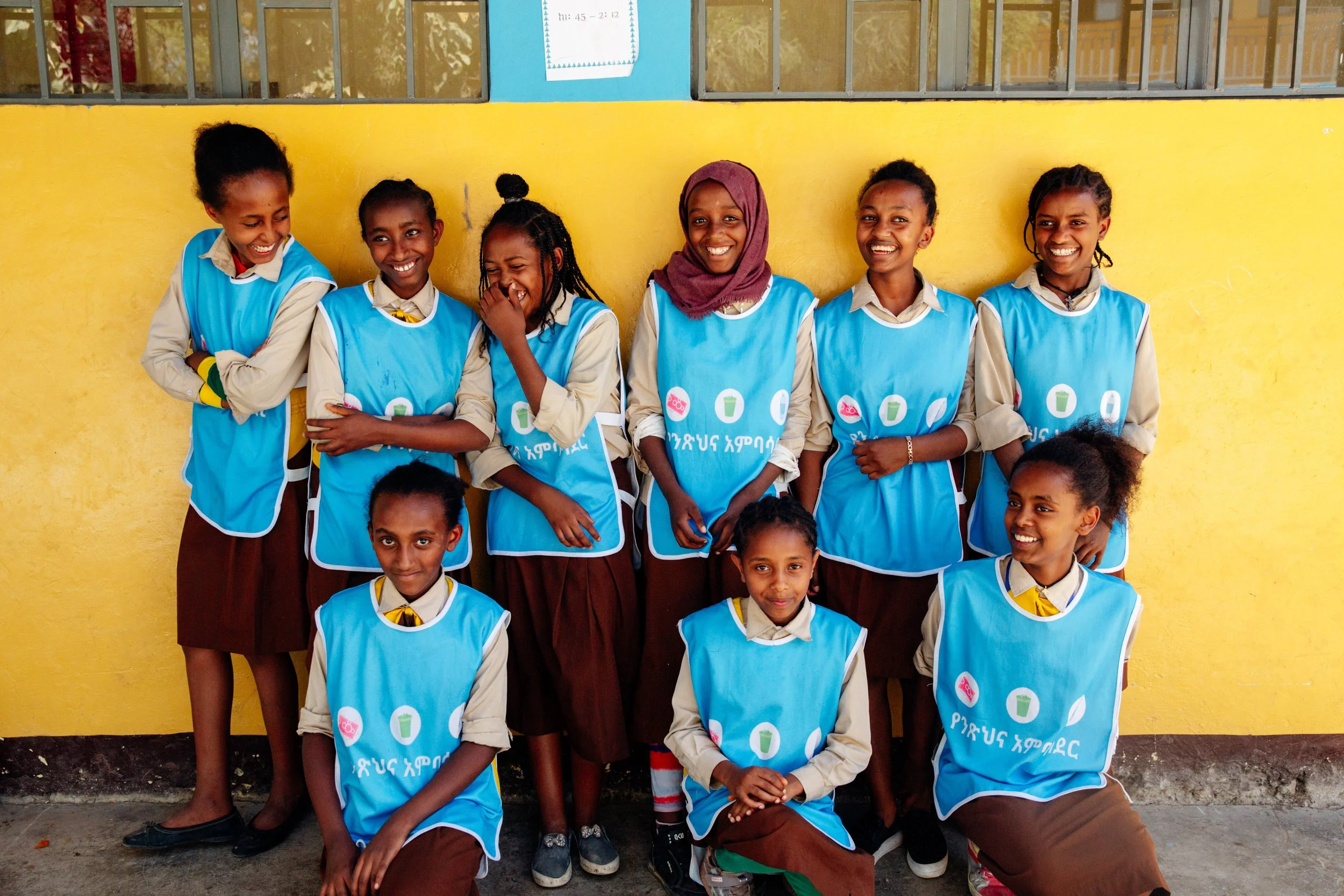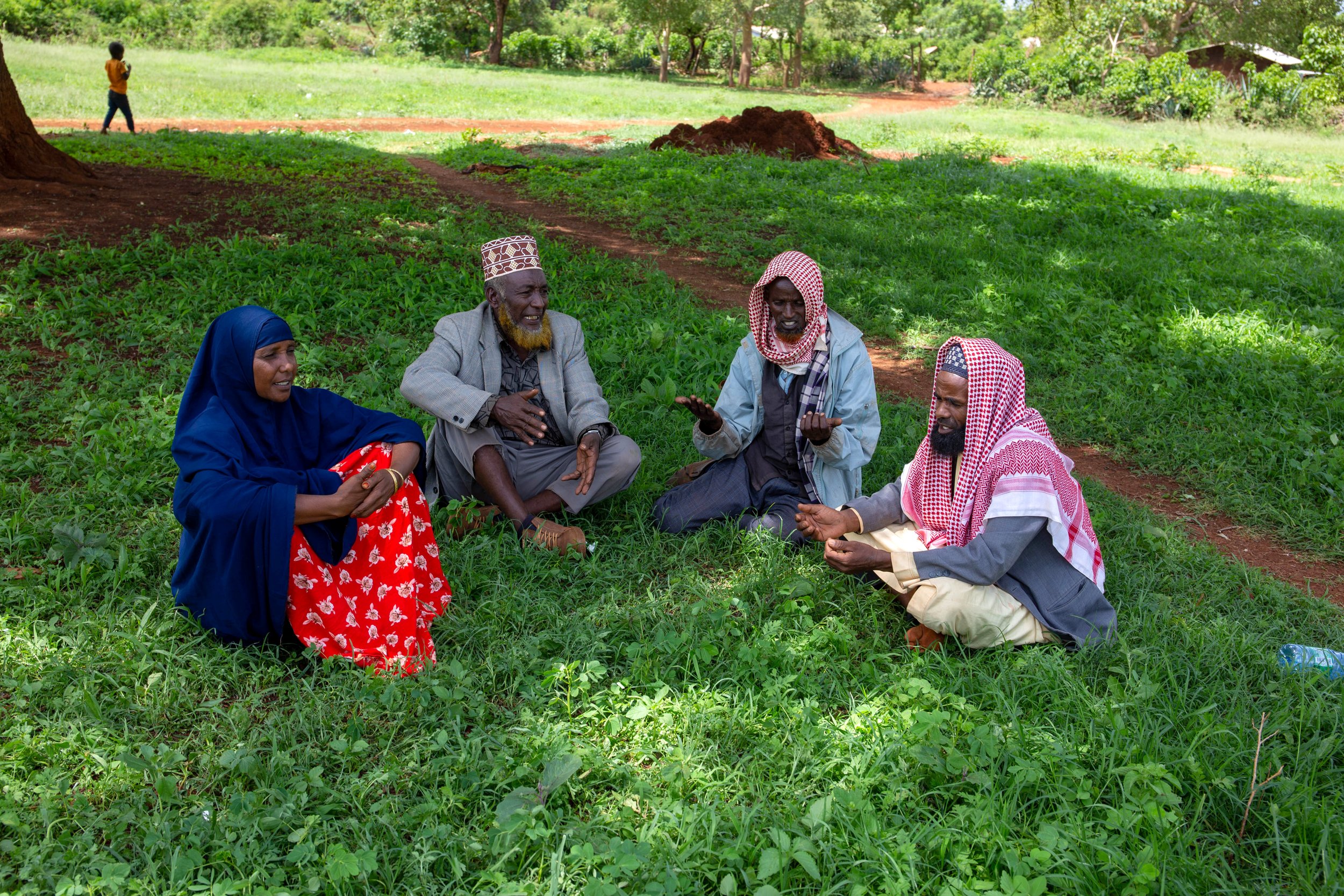This Year 3 update shows that momentum has continued in Mwogo and Juru Sectors, with major delivery milestones now complete and results at scale.
A Brighter Future for Berbere: Clean Water for Coffee Communities in Ethiopia
While Project Waterfall’s involvement in this project has now come to an end, we’re proud to share an update from our delivery partner WaterAid on the lasting impact your support has made.
Berbere is a coffee-growing district in Ethiopia’s Oromia region, nestled at the foot of the Bale Mountains, around 500km from Addis Ababa. Like many rural communities in Ethiopia, Berbere is feeling the effects of the climate crisis firsthand. Unpredictable rainfall, deforestation, and increasingly severe floods and droughts are making life harder for the people who live and farm here, many of whom already face huge challenges when it comes to accessing clean water and sanitation.
In fact, Berbere has been identified by the Ethiopian government as one of the top priority areas for water, sanitation and hygiene (WASH) support, and thanks to you, we’ve been able to help.
Over the past three years, working alongside our partner WaterAid, local government, and the community itself, this project has delivered real, lasting change, bringing climate-resilient WASH solutions to thousands of people across the region.
Here’s what’s been achieved so far…
💧 Clean water, close to home
For the first time, 23,137 people now have access to clean water through 12 new community water points.
This includes:
1,677 students across three schools
12,073 patients and staff in two healthcare centres
A brand-new solar-powered pumping system providing a sustainable and reliable source of water
🧼 Promoting good hygiene
Access to water is just the start — changing behaviours and raising awareness is key to improving health and wellbeing.
13,641 people have taken part in hygiene education sessions
167 mothers have received targeted hygiene training to help protect maternal and infant health
4 new sanitation businesses have been set up, and 16 people have been trained in toilet slab production, creating jobs and promoting better sanitation across the district
🛠️ Building long-term resilience
To make sure this progress lasts, we’ve supported the community to take ownership of water resources and plan for the future.
A watershed management plan has been developed for the whole district
A new data and information management system has been set up in Haro Dumal town to help with long-term WASH planning
⚖️ Supporting local leadership
Training and local governance are vital to keeping these systems running well into the future.
38 people, including water user association members, utility staff and local officials, have been trained in managing water systems, overseeing finances, and taking care of infrastructure
📢 Sharing what we’ve learned
This project isn’t just about local impact, it’s about sharing knowledge and influencing broader change.
Three policy briefing notes have been developed to help inform future WASH projects
A policy dialogue forum was held to encourage collaboration and learning between key stakeholders
In her own words: Meet Asrat
Asrat Areda is a shop owner and mother of three living in Haro Dumal town. Thanks to this project, her family now has clean water just outside their home.
“Having clean water near our house means everything to me. When I was my children's age, we used to collect water from a river. But now, my children won't do that. They won’t be going to the river to collect water. This makes me really happy. This is what every parent wants to see — their children living a better life.
“Now we have a public tap right in front of our compound. We don't waste time going to the river anymore. We use the water to keep clean and take a bath. The water is clean, and we use it without hesitation. It’s been over a month since we started collecting water from the new tap.”
Thank you
This progress simply wouldn’t have been possible without your support. Together, we’ve helped lay the foundations for healthier, more resilient coffee-growing communities in Berbere, communities that can face the future with strength, dignity, and hope.
From all of us at Project Waterfall: thank you.
World Water Day 2025: Why Glacier Preservation Matters for Coffee Communities
Every year on March 22nd, World Water Day unites people around the world to highlight the importance of water and the challenges facing communities without reliable access. This year’s theme, Glacier Preservation, draws attention to one of the most pressing global issues, rapid glacial loss and its impact on freshwater supplies.
At first glance, glaciers may seem far removed from the coffee industry. But for millions of people living in coffee-growing regions, shrinking glaciers and shifting water patterns present a serious threat to their livelihoods, their crops, and their daily survival.
Why Glacier Preservation Matters for Coffee Communities
Glaciers act as natural water reservoirs, slowly releasing fresh water that supports ecosystems, agriculture, and drinking water supplies. According to the United Nations, glaciers provide nearly 70% of the world’s freshwater. However, rising global temperatures are causing glaciers to melt at an alarming rate, disrupting these water sources and creating unpredictable shortages.
For coffee farmers, these changes can be devastating. Many coffee-growing regions already struggle with seasonal droughts and inconsistent rainfall. A study by the International Coffee Organization (ICO) found that climate change-driven water shortages are a growing concern for coffee producers worldwide. As glaciers shrink, water sources dry up, and farming becomes even more difficult. In some areas, unreliable access to water forces farmers to abandon coffee production altogether, threatening the long-term sustainability of the industry.
Beyond agriculture, the lack of clean water affects every aspect of daily life. Families in these communities often spend hours each day collecting water, leaving less time for work, education, or other essential activities. Poor sanitation and hygiene conditions lead to higher rates of disease, especially among children. Without intervention, these challenges will only become more severe as water scarcity worsens.
At Project Waterfall, we’re committed to tackling these issues by delivering clean water, sanitation, and hygiene education to coffee-growing communities. This year, we’re continuing our work to build sustainable water systems, ensuring that coffee farmers and their families have access to this most basic human right.
Accelerating Access: Project Waterfall’s Work in Rwanda
One of our flagship initiatives, the Accelerating Access project in Rwanda, is designed to break down the barriers to clean water in coffee-farming regions. In partnership with WaterAid, we’re working in Mwogo and Juru, two areas where water shortages and poor sanitation have long been obstacles to development.
Through this project, we are ensuring that thousands of people, including coffee farmers, their families, and surrounding communities, have access to clean, reliable water for drinking, farming, and daily needs.
Key Achievements Over the Past Year
✅ Delivering Clean Water
We completed a major water supply scheme, bringing clean water to 35,000 people through 23 new public taps directly connected to a sustainable water system.
These new taps drastically reduce the time spent collecting water, freeing up hours each day for work, education, and community life.
🚰 Improving Hygiene and Sanitation
Clean water alone isn’t enough, we’re also working to improve hygiene practices and sanitation infrastructure:
700 households received training on how to upgrade and maintain safe, hygienic toilets.
187,188 community members were engaged through hygiene education campaigns led by local health workers and village leaders.
824 parents took part in education programs on pregnancy, breastfeeding, and child health, ensuring the next generation grows up healthier.
🔄 Building Long-Term Sustainability
To create lasting impact, we’re working closely with local partners, including WASAC (Rwanda’s Water and Sanitation Corporation) and community organizations.
We’ve been reviewing and rehabilitating disused water facilities, ensuring that previously abandoned infrastructure is repaired and put to good use.
This work is about more than just providing clean water, it’s about empowering communities, improving public health, and creating a sustainable future for coffee-growing families.
Water & Coffee: Join the Conversation
The connection between water, climate change, and coffee is complex, but conversations spark action. That’s why this May, we’re hosting a special water panel talk, bringing together industry leaders, sustainability experts, and advocates to explore the impact of water on coffee and discuss solutions for a more sustainable future.
📢 Stay tuned for more details!
Why Your Support Matters
As we celebrate World Water Day, we’re reminded that water connects us all, from melting glaciers to the coffee in your cup. The choices we make today will determine the future of our planet, our water systems, and the millions of people who depend on them.
At Project Waterfall, we believe that access to clean water isn’t just a privilege, it’s a human right. By working together, we can make this right a reality for coffee-growing communities across the world.
Whether you’re a coffee business, an individual supporter, or an industry leader, your involvement makes a difference. Help us spread the word, support our initiatives, and be part of the change.
Accelerate Action for Gender Equality
International Women’s Day 2025 is a call to Accelerate Action towards gender equality. At the current rate of progress, it will take until 2158, which is roughly five generations from now, to reach full gender parity, according to data from the World Economic Forum. By taking decisive action today, we can break systemic barriers and create opportunities for women and girls worldwide.
Programme Update: How Clean Water and Sanitation Are Transforming Education in Ethiopia
Project Waterfall is tackling the global water crisis by bringing clean water, sanitation, and hygiene (WASH) initiatives to coffee-growing communities. Ethiopia, one of the world’s largest coffee producers, relies on coffee as its top export, accounting for over 25% of the country’s total exports. Over the past 18 months, we have partnered with Splash to implement sustainable WASH solutions at schools in Addis Ababa, the nation’s capital. The Barzilai Foundation funded two schools, Tsehay Chora and Atse Tewoderos. In November, Tom Cawthorn, the Program Advisor from the Barzilai Foundation, visited the schools to see the completed transformations first-hand.
Both schools have long struggled with inadequate WASH facilities. At Atse Tewoderos, water was only available twice a week, and existing water stations were inconveniently located near toilets. Tsehay Chora, serves students from nearby informal settlement who face severe water shortages and inadequate sanitation facilities. The lack of resources not only impacted health but also attendance at school, particularly for girls during menstruation.
The Barzilai Foundation partnered with Project Waterfall to address these challenges. As Brandon Sosa, CEO of the Barzilai Foundation, explains, “Knowing how much WASH facilities can drive student health and academic results, we are thrilled to partner with Project Waterfall to empower future generations to break out of poverty.” This combined effort aims to eliminate barriers to education and improve student outcomes.
The program has focused on delivering safe, reliable water through advanced purification systems and better storage solutions. Child-friendly drinking stations were installed in accessible locations to encourage regular use. To improve sanitation, new toilet blocks were built using cost-effective designs that local governments are now adopting as a model. Handwashing stations were also introduced, paired with engaging hygiene education to help students adopt and sustain healthy practices.
By the end of 2024, WASH infrastructure improvements were completed, directly benefiting 1,200 daytime students, 1,000 adult evening students, and 170 staff members. Hygiene training was extended to school leadership, janitors, and food handlers to ensure long-term sustainability. The menstrual health program significantly reduced teasing around menstruation, while mothers reported feeling more comfortable discussing puberty with their children.
Improved attendance is already making an impact. In Ethiopia, secondary school graduation more than doubles a student’s expected lifetime earnings. Girls, in particular, see a 20% increase in earnings for each additional year of schooling. Addressing WASH challenges is helping students stay in school and break cycles of poverty, paving the way for brighter futures.
Despite successes, the program faced challenges. Delays in building sanitation facilities required close coordination with local government partners to keep things on track. Ethiopia’s internal conflict also posed risks, but proactive planning and collaboration with local staff ensured the safety of team members and continuity of activities.
Through the support of the Barzilai Foundation and the collaboration of local partners and Splash, Project Waterfall has removed significant barriers to education for thousands of students. With clean water, proper sanitation, and essential hygiene education, these young learners are better equipped to focus on their studies, stay in school, and achieve their potential.
Project Update: Progress in 2024 in Ethiopia and Rwanda
Access to clean water and proper sanitation is a cornerstone of health, education, and economic stability, yet many coffee-growing communities still face daily struggles to meet these basic needs. At Project Waterfall, we’re determined to change that, and thanks to your support, we’re making significant progress.
Year 2 Project Update: Transforming Water and Sanitation Access in Rwanda
This year Project Waterfall’s flagship campaign UK Coffee Week is raising funds for WaterAid’s Accelerating Access project in rural Rwanda which it started funding in the second year of the three-year project. It aims to reach 46,845 people in the communities of Mwogo and Juru regions with Water, Sanitation and Hygiene (WASH) by 2025. This is with Rwanda's water utility (WASAC), implementing partner COFORWA, and the local community to ensure sustainability and longevity of the project.
Stories from Rwanda: The Race for Hygiene
The Bugesera Race for Hygiene is an annual road race organized by the district and stakeholders that helps promote messages of good hygiene practices. This year, WaterAid promoted their hygiene campaign and reached 100,000 people with topics including handwashing, personal hygiene, and improvement of household toilets.
Stories from Rwanda: Water and Health
Access to clean water and sanitation has many benefits, but perhaps the most obvious and the one that we emphasize most is the impact accessibility has on health. 1.6 million people every year die from water-related diseases, and by increasing access to clean water and providing education around hygiene, we are working to help positively change as many lives as we can. These are two stories from individuals in the health care sector in Rwanda that share the impact the accelerating access project in Rwanda has had on health.
Project Launch: Clean Water and Sanitation in Bugesera Rwanda
Over the past year our partner @WaterAid has been working with the district government of Bugesera, Rwanda on a project that aims to provide 46,845 people in the communities of Mwogo and Juru with Water, Sanitation and Hygiene (WASH) by 2025. We are delighted to announce that we will be supporting this project as it moves into it’s second year.
Introducing Project WISE: Ethiopia
Through Project WISE (WASH in Schools for Everyone), our delivery partner Splash aims to transform WASH conditions at 100% of public schools in four cities in Ethiopia, serving one million children and providing an affordable, proven and replicable model for national coverage for all schools and all students. The first city in the program is Addis Ababa, the capital of Ethiopia – and we’re delighted to be working with them to transform WASH solutions in six schools across the capital.
World Water Day - Water for Peace: Uniting for a Sustainable Future
‘Water for Peace’ is the theme for World Water Day 2024, and it's imperative to recognise the pivotal role water plays in shaping peace and conflict worldwide. In a world where over 3 billion people depend on water that crosses national borders, the need for cooperation and equitable access has never been more pressing.
The Ripple Effect: Clean Water and Sanitation as Catalysts for Women's Inclusion in Decision-Making
The theme for 2024’s International Women’s Day is Inspire Inclusion, in particular the promotion of diversity in leadership and decision-making positions. In the pursuit of gender equality and women's empowerment, access to clean water and sanitation (WASH) emerges as a critical factor, impacting not only the health and well-being of women but also their ability to participate in decision-making processes.
Project Update: Masindi, Kiryandongo & Luuka districts in Uganda
The Big Water Walk
World Water Day – Wednesday 22 March
While we enjoy the purest filtered water in our coffee, the communities at the end of its supply chain face a water crisis.
On Wednesday 22 March we celebrate World Water Day. Every year, this date marks a global reflection on the importance of fresh and sustainable water - a source of life which 771 million people still don’t have access to. It’s a day for us all to take part in bringing the water crisis to a permanent end.
This year, hundreds of baristas, workplaces and coffee lovers will be taking part in our new event, The Big Water Walk, which aims to raise awareness for the communities that have to walk for hours every day to collect their water.
Supporters will set off at 11am and follow a 5K, 10K or 15K route along the Thames carrying as much weight as they can to walk in solidarity with the women and children who have to carry heavy jerry cans full of water on a daily basis. Teams from Google, 640 East, Ikawa, Allegra, Social Pantry, RIG, Doppio & Future Self will be taking part, along with coffee professionals, local schools and coffee lovers.
Businesses and schools across the UK will be taking part in The Big Water Walk by organising their own walks in their local communities. Barista & Co. & 92 Degrees Coffee have collaborated with us on official walks in Bournemouth and Liverpool respectively. Other companies taking part by organising a local walk include BRITA, Stokes, UCC Coffee & Union.
To get involved and support the campaign visit www.justgiving.com/campaign/TheBigWaterWalk
